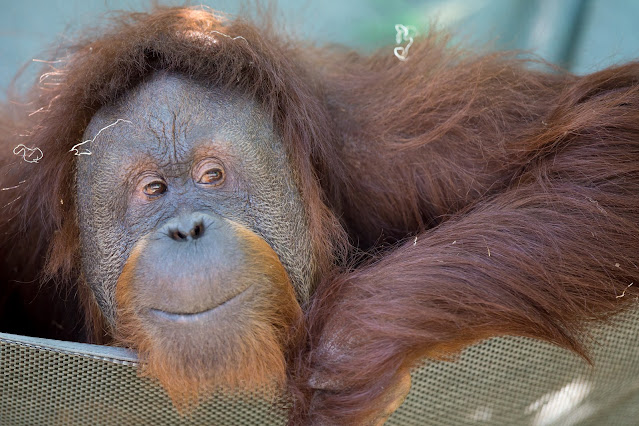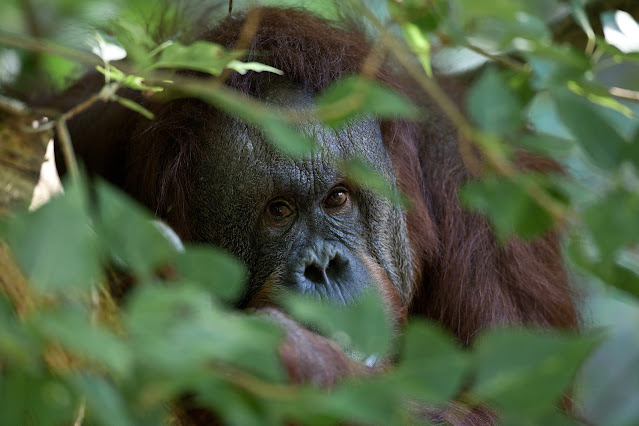Posted by Gigi Allianic/ Woodland Park Zoo
 |
| Melati, photo by Jeremy Dwyer-Lindgren/Woodland Park Zoo |
Woodland Park Zoo is mourning the loss of Melati, a female orangutan who passed away while recovering from a surgical procedure. The surgery was performed to remove possibly cancerous growths of the uterus and left ovary as a life-saving measure and to alleviate pain and discomfort associated with her significant reproductive disease.
The 193-pound orangutan would have turned 50 on December 27 and was the oldest orangutan living at the zoo. The median life expectancy for orangutans is 28 years; in zoos, orangutans are now living in to their 40s and 50s because of the evolving field of zoo medicine, which includes geriatric care.“Losing our animals is very difficult, they are family to us. Melati lived at Woodland Park Zoo for nearly five decades and was a role model mother to her two offspring who continue to thrive here,” said Martin Ramirez, mammal curator at Woodland Park Zoo. “Melati will be remembered by her animal keepers as a very laid-back orangutan, and by our guests as an inquisitive individual. She would often look inside purses or bags that were close to the exhibit window and point to items that she wanted to see up close. One of her favorite enrichments was a soapy bucket and sponge, which she would use to ‘scrub’ her floors.”
 |
| Melati, photo by Jeremy Dwyer-Lindgren/Woodland Park Zoo |
Orangutans are facing many threats in their native habitats and Melati was an important ambassador for her species. “Melati and her fellow orangutans have inspired our visitors to help save orangutans and make lifestyle changes, such as converting to purchasing items with sustainable palm oil,” added Ramirez.
Dr. Tim Storms, Interim Director of Animal Health at Woodland Park Zoo, explained that they had been treating Melati for an existing problem of uterine fibroids since 2018. A recheck exam over the summer indicated significant, concerning changes in her uterus and ovaries. Full-body CT imaging was performed and revealed large masses of the reproductive tract with high suspicion of malignancy, which were in turn affecting her left ureter, left kidney, urinary bladder and colon. The pressure-induced impact on the left ureter and kidney were the most concerning and posed a significant risk to her life if not addressed.
On pre-procedure CT imaging there was no apparent metastasis and Melati’s lung, heart and liver all appeared to be in good condition. “Despite these encouraging findings that showed this was the optimal time to act, we were in a very tough position knowing that the planned procedure posed significant risk to Melati, given her age and the complexities of the surgery,” said Storms. “We made the complex decision to proceed with surgery to remove the possibly cancerous tissue and alleviate the pressure on surrounding structures, which was likely causing her pain and compromised mobility. Losing Melati is an unfortunate outcome we were up against.”
Because of Melati’s medical condition and age, the zoo’s veterinary team methodically prepared for every scenario including the possibility of blood loss. Fortunately, Melati’s son, 32-year-old Heran who still lives at Woodland Park Zoo, is a compatible blood donor for her. “It was critical to prepare for every possible scenario to manage the risks and ensure a successful surgery. A few days before Melati’s surgery, we anesthetized Heran for a comprehensive preventive health exam. After confirming his compatibility, we took the opportunity to collect two units of blood in the event Melati needed a blood transfusion,” added Storms.
Consulting gynecologic surgeons Dr. Emily Norland, Dr. Barbara Norquist, and Dr. Kathryn Pennington, in addition to radiologist Dr. Rob Liddell and cardiac sonographer Amy Owens, joined the zoo’s veterinary team for the surgery. “We’re so grateful for the medical team who gathered to help Melati and for the network of volunteer medical specialists who for decades has graciously donated their expertise, time, and resources to Woodland Park Zoo so we can provide top-notch health care for Melati and each of the 900 animals in our care,” said Storms.
As a standard procedure, the zoo’s animal health team will perform a postmortem exam to further diagnose factors that may have contributed to Melati’s decline and to share the results nationally among colleague scientists to help advance the understanding of medical issues in orangutans.
Dr. Tim Storms, Interim Director of Animal Health at Woodland Park Zoo, explained that they had been treating Melati for an existing problem of uterine fibroids since 2018. A recheck exam over the summer indicated significant, concerning changes in her uterus and ovaries. Full-body CT imaging was performed and revealed large masses of the reproductive tract with high suspicion of malignancy, which were in turn affecting her left ureter, left kidney, urinary bladder and colon. The pressure-induced impact on the left ureter and kidney were the most concerning and posed a significant risk to her life if not addressed.
On pre-procedure CT imaging there was no apparent metastasis and Melati’s lung, heart and liver all appeared to be in good condition. “Despite these encouraging findings that showed this was the optimal time to act, we were in a very tough position knowing that the planned procedure posed significant risk to Melati, given her age and the complexities of the surgery,” said Storms. “We made the complex decision to proceed with surgery to remove the possibly cancerous tissue and alleviate the pressure on surrounding structures, which was likely causing her pain and compromised mobility. Losing Melati is an unfortunate outcome we were up against.”
Because of Melati’s medical condition and age, the zoo’s veterinary team methodically prepared for every scenario including the possibility of blood loss. Fortunately, Melati’s son, 32-year-old Heran who still lives at Woodland Park Zoo, is a compatible blood donor for her. “It was critical to prepare for every possible scenario to manage the risks and ensure a successful surgery. A few days before Melati’s surgery, we anesthetized Heran for a comprehensive preventive health exam. After confirming his compatibility, we took the opportunity to collect two units of blood in the event Melati needed a blood transfusion,” added Storms.
As a standard procedure, the zoo’s animal health team will perform a postmortem exam to further diagnose factors that may have contributed to Melati’s decline and to share the results nationally among colleague scientists to help advance the understanding of medical issues in orangutans.
 |
| Melati, photo by Jeremy Dwyer-Lindgren/Woodland Park Zoo |
Melati has lived at Woodland Park Zoo since 1974. In addition to son Heran, she leaves behind a daughter, 40-year-old Belawan, who remains at the zoo. The other orangutans currently at the zoo are a male, Godek, and female, Batu, both 12. Batu arrived at the zoo in the spring.
There are three species of orangutans and are found only in Southeast Asia: the Bornean orangutan native to the island of Borneo, and Sumatran and Tapanuli orangutans native to the island of Sumatra. All three species are critically endangered. Orangutans belong to the family Hominidae, which includes all four great apes: gorillas, chimpanzees, bonobos and orangutans.
To pay tribute to Melati, you can adopt the species through the zoo’s ZooParent program, which supports the zoo’s animal care, education and wildlife conservation efforts. Woodland Park Zoo supports the HUTAN-Kinabatangan Orangutan Conservation Program and Gunung Palung Orangutan Conservation Program, both on the island of Borneo.
 |
| Sweet Melati, photo by Dennis Dow/Woodland Park Zoo |

Comments
Post a Comment